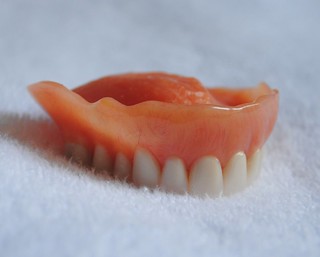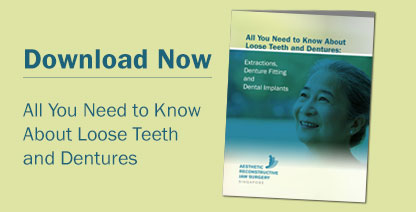Share this
Why Do My Dentures Not Fit Like They Used To?
on February 4, 2014
 Dentures that fit poorly are a very common problem, affecting most Singapore denture wearers eventually. It is especially common with the lower denture, since it has less support than an upper one and is affected by the motion of the cheeks and tongue. Most often, dentures fit poorly due to changes that occur in a jaw after tooth loss, which affect the gum ridge and the bone underneath, altering denture fit over time. However, there are solutions to ill-fitting dentures and it isn't a problem that should be let go, so if you're having trouble, see your dentist for help.
Dentures that fit poorly are a very common problem, affecting most Singapore denture wearers eventually. It is especially common with the lower denture, since it has less support than an upper one and is affected by the motion of the cheeks and tongue. Most often, dentures fit poorly due to changes that occur in a jaw after tooth loss, which affect the gum ridge and the bone underneath, altering denture fit over time. However, there are solutions to ill-fitting dentures and it isn't a problem that should be let go, so if you're having trouble, see your dentist for help.
Why Your Dentures Fit Poorly
"Why do my dentures not fit like they used to?"
Changes in oral structure are an inevitable consequence of tooth loss. Bone loss is generally the most significant change, which begins immediately after tooth loss, a process that is called resorption and caused by the lack of tooth roots in the jaw. Tooth roots provide stimulation to the jawbone as a person chews that triggers the body's natural bone repair and maintenance process, prompting the production of new bone cells to maintain the jawbone strength, size and density.
Without that stimulation, the jawbone melts away, shrinking in both height and width. As the jawbone shrinks away, the size and shape of the gums change also, eroding support for dentures, and the pressure placed on these structures by the dentures themselves can accelerate the process. Because of these changes, it is recommended that all denture wearers see a dentist for a checkup once a year. If dentures fit has deteriorated, the dentist will suggest relining or replacement to restore stability. On average, dentures will have to be relined or replaced every five to seven years to maintain a secure and comfortable fit.
Permanent Dentures in Singapore
After years of denture use, some denture wearers find that oral structure has deteriorated to the point that relining or replacing dentures can no longer offer the stability they need to bite, chew or speak properly. However, this doesn't mean that denture wearers who have reached this point have to live with the pain, discomfort and difficulties of poor fitting dentures. Dental implants can offer a several solutions in these situations. They can be used to firmly anchor a conventional denture, improving stability, or as the foundation for removable or fixed implant-supported dental restorations.
If your dentures fit poorly, don't ignore the problem. Doing so can affect your oral health, causing gum irritation, inflammation, pain, infection and mouth sores. It can affect your general health as well, making good nutrition a challenge and, due to poor chewing efficiency, digestive problems more likely. Aside from the practical problems, loose dentures are just plain uncomfortable and can be quite embarrassing if they slip or click in the middle of a conversation or a meal. So see your dentist and get those dentures taken care of so you can get back to eating, speaking and smiling with confidence.
Photo credit: Kathy McGraw
Share this
- Jaw Surgery (93)
- Dental Implants Singapore (90)
- Orthognathic Surgery (48)
- Replacing Missing Teeth (26)
- Missing Teeth Options (23)
- Underbite (23)
- Bone Grafting (21)
- Costs (18)
- Facial Aesthetics (18)
- Aesthetics (17)
- dental implants (16)
- corrective jaw surgery (15)
- BOTOX (11)
- Dermal Fillers (11)
- Wisdom teeth (10)
- Fixed Implant Dentures (8)
- Loose Dentures Singapore (6)
- Medisave (6)
- sleep apnea (6)
- Braces (5)
- Dental Pain (5)
- Dentures in Singapore (5)
- Loose Teeth (5)
- Tooth Extraction (5)
- jaw deformities (5)
- bimax (4)
- bone graft (4)
- maxillomandibular advancement (4)
- all-on-4 (3)
- bimaxillary protrusion (3)
- chin implant (3)
- facial asymmetry (3)
- full mouth dental implants (3)
- genioplasty (3)
- immediate implant (3)
- removal of an integrated dental implant (3)
- third molars (3)
- wisdom tooth surgery (3)
- My Dentures Don't Fit (2)
- VME (2)
- bone graft healing (2)
- distraction osteogenesis (2)
- medical tourism (2)
- obstructive sleep apnea (2)
- orthodontics (2)
- plastic surgery (2)
- CT guided dental implants (1)
- Double jaw surgery (1)
- Invisalign (1)
- Periodontal Disease (1)
- Permanent Dentures Singapore (1)
- before and after photos (1)
- facial trauma (1)
- fractured dental implant (1)
- oral appliance therapy (1)
- root canal treatment (1)
- veneers (1)
- vertical maxillary excess (1)
- September 2019 (2)
- July 2019 (2)
- May 2019 (2)
- August 2018 (1)
- October 2017 (1)
- September 2017 (2)
- August 2017 (1)
- June 2017 (2)
- May 2017 (4)
- April 2017 (1)
- March 2017 (1)
- February 2017 (3)
- January 2017 (3)
- December 2016 (1)
- November 2016 (2)
- October 2016 (4)
- September 2016 (9)
- August 2016 (5)
- July 2016 (11)
- June 2016 (14)
- May 2016 (6)
- April 2016 (2)
- March 2016 (1)
- January 2016 (7)
- December 2015 (10)
- November 2015 (4)
- October 2015 (9)
- September 2015 (7)
- August 2015 (1)
- July 2015 (6)
- June 2015 (3)
- May 2015 (7)
- April 2015 (5)
- March 2015 (8)
- January 2015 (5)
- December 2014 (7)
- November 2014 (7)
- October 2014 (6)
- September 2014 (8)
- August 2014 (5)
- July 2014 (7)
- June 2014 (8)
- May 2014 (9)
- April 2014 (10)
- March 2014 (6)
- February 2014 (8)
- January 2014 (3)
Subscribe by email
Email subscription




No Comments Yet
Let us know what you think